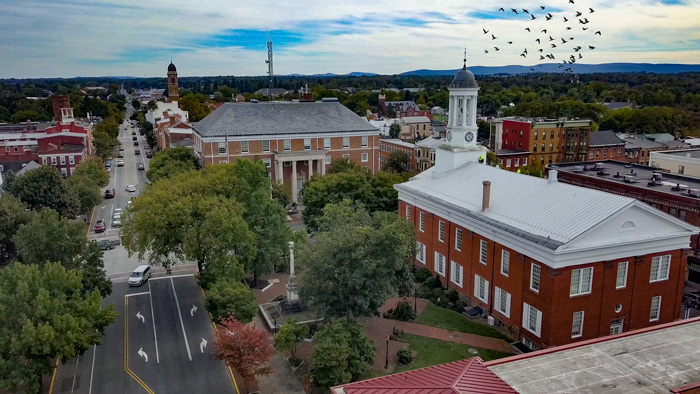Dickinson College and Carlisle Team Up to Tackle Greenhouse Gas Emissions

Local climate action plan to emerge from March Borough Council workshop
by Tony Moore
Addressing the vast issue of climate change probably feels like too much of an undertaking for any local community to tackle. But in fact, it can be a “think globally, act locally” issue, and Dickinson College students recently stepped up to do just that on the issue of greenhouse gas.
Seeking change
The Pennsylvania Department of Environmental Protection recently started a climate action assistance program for local governments, through which participating municipalities will measure their greenhouse gas emissions and develop a climate action plan. In fall 2019, 20 local governments signed on with 12 colleges, who sent their students into the field to help. Dickinson students, via the Center for Sustainability Education (CSE), worked with the Borough of Carlisle while receiving valuable training from Local Governments for Sustainability, a nonprofit that works internationally with cities on climate change.
“Attending Dickinson, I’ve heard much talk about the importance of sustainability …, yet I have always felt as though my individual actions make little difference,” says Mark Frenzel-Sulyok ’20 (international business & management). “So to have the opportunity to connect my individual actions to something that could create real results was enticing.”
Data on emissions were collected with the help of utility companies that serve the Carlisle area, supplemented with estimates on other usage/emissions. And the Carlisle Borough Council, keenly aware of the human contribution to climate change, was eager to dive in with Dickinson’s students.
“We understand that although the lasting remedies must come at the national and international level, inaction at the national level does not relieve us of our duty to take action locally,” says Sean Shultz, Carlisle’s deputy mayor, noting that students will present their greenhouse gas findings at the March Borough Council workshop. “Our partnership with Dickinson on this and other projects over the years are always a great benefit to our borough and, I hope, the college.”
The partnership is just one of the many ways Dickinson makes civic engagement and sustainability core parts of its mission and the student experience. Through service learning, community-based research and independent applied research opportunities, Dickinson encourages students to explore how they can make a difference in their communities. Those efforts recently earned the college the Carnegie Community Engagement Classification, which honors institutional commitment to enriching teaching and research while also benefiting the broader community. Dickinson's sustainability efforts have consistently earned the college spots on the Princeton Review's Green Honor Roll and Sierra magazine's "Cool Schools" list, and this year the college will meet its goal to achieve carbon neutrality.
An opportunity seized
Schultz says preliminary data show that the borough is “fairly average” in regards to per-person greenhouse gas emissions—but that it’s “not a good thing.”
“It’s important for smaller communities like Carlisle to address the problem of greenhouse gas emissions, because those emissions go right back into the lungs of its residents,” says Sam Lavine ’22 (history, political science), who notes that local studies like this are key to crafting action plans at both the local and national level. “This would not only be better for the health of the global ecosystem, but it would help improve the health of people in Carlisle.”
Students are currently working to collect and review information that could help inform the development of a climate action plan. That includes, for example, climate action plans of other communities of similar size as well as plans and programs of businesses and other entities for energy management and conservation, renewable energy, more efficient and cleaner transportation fleets, and employee commuting.
Once students present the full findings to the Borough Council, a conversation will take place about whether and how the process will move forward for the borough to develop and potentially adopt a climate action plan. For Carlisle, balancing strategies to reform borough land use policies to mitigate greenhouse gas emissions while sustaining the tax base that supports the critical services local government provides will be at the forefront of the effort.
“Climate change and global warming are challenges, but we don't have to look at those challenges as doom and gloom,” says Schultz. “They're an opportunity for us to rise and grow beyond our old ways. The students impressed me with their passion, inquisitiveness and desire to drill down to the facts with our local greenhouse gas inventory. And I hope we can look back on this process years from now and say we grasped it as an opportunity and did our all to make the very best of it.”
The presentation will take place Wednesday, March 4, at 6 p.m. at the Borough Council Workshop Session at Carlisle Borough Hall (53 W. South St.).
TAKE THE NEXT STEPS
Published February 12, 2020